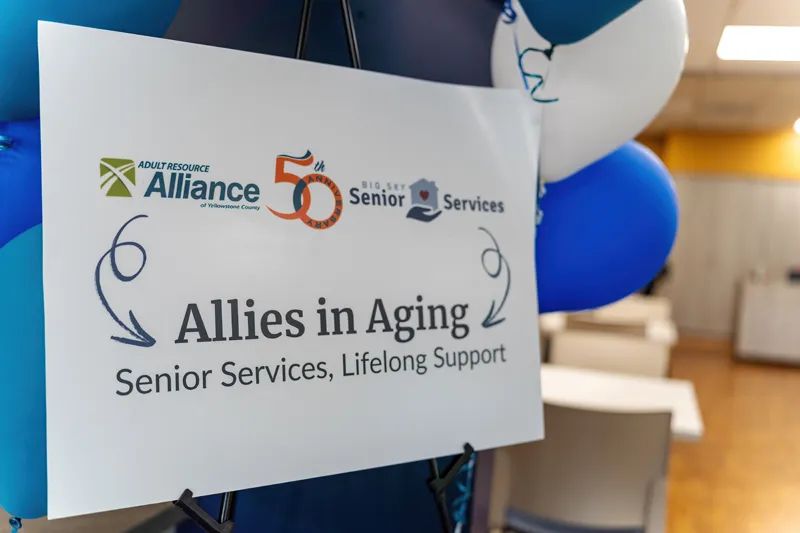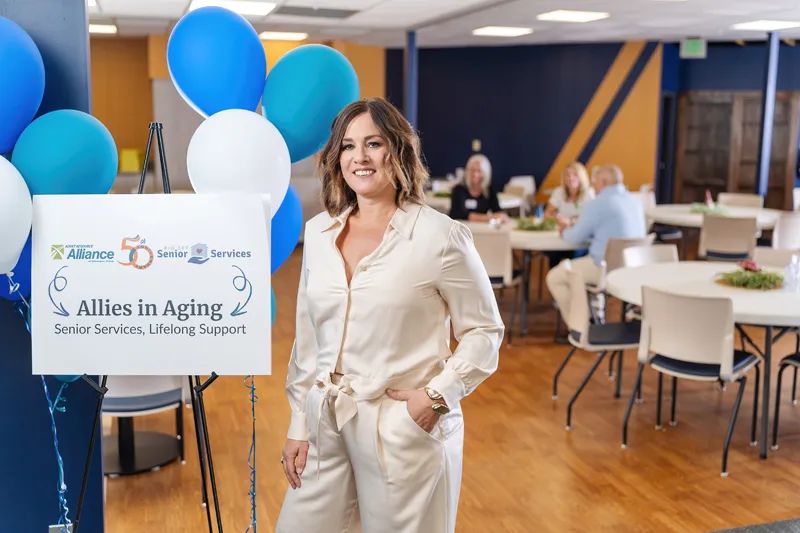
Leading With Fire
Erika Purington is a changemaker, ready to uplift the underserved
Erika Purington has always had a fire in her belly to serve others. When she sees a group whose voices aren’t being heard, she grabs her organizational megaphone. Over the years, she’s advocated for people with disabilities, found innovative ways to support homeless teens, and championed children in the foster care system. Now, as Chief Executive Officer of Allies in Aging (formerly Adult Resource Alliance), she’s channeling that same passion into one of our community’s most urgent needs: supporting our community’s rapidly growing senior population.
Ask her what ignited this drive, and she’ll take you back 35 years.
“I had some experiences very early on that were challenging and traumatic,” Erika says. “It created a drive in me to make things happen.”
At 17, Erika’s life was on what she called “a pretty clear trajectory.” She was a social butterfly, a cheerleader, and an athlete at Skyview High destined to earn a college track scholarship. But suddenly, that clear trajectory veered off course.
“I ended up pregnant at 17,” Erika says. “And the events that led to the pregnancy were non-consensual. I was not in a position to consent. So, it was trauma on top of trauma.”
She looks into the distance as she recalls the slivers of memory she has from that night.
“I was with some girlfriends. We had way too much to drink and... they left,” Erika says. “I have snippets of the evening, but there is so much shame that goes with that. I didn’t call it rape until probably eight years ago in therapy — but that’s what it was.”
News of her pregnancy spread like wildfire around her high school. She remembers parent meetings where people called for her to step down from the cheer squad and hurtful interactions with teachers.
“I was nominated for one of the formal dance queens,” Erika says. “I remember one of the teachers pulling me into a broom closet and telling me, ‘We think it’s best that you don’t accept it.’ I was fiery then, too. I said, ‘Oh, had you not said that, I wouldn’t have cared. But since you did, I’m absolutely going to make a stand. There are girls who are nominated who have had abortions — and I’m not judging that — but it’s no different because I chose to keep my baby. So, no. That isn’t going to work for me.’”
Erika won the crown.
Surprisingly, when asked if she could rewind time and change those life events, she unequivocally says no. “What came with that is this incredible human that absolutely, 100 percent changed my life.” The events also became a driving force in her career. “It lit a major passion within me,” Erika says, a passion to help others feel seen and heard.
Her career began at Youth Dynamics as a treatment manager working with therapeutic foster care homes. The work was raw and eye-opening.
“My greatest lesson at Youth Dynamics was that love isn’t enough,” she says.
That lesson centered on a boy from one of the reservations who had been placed in foster care in a small rural community.
“Tribal leadership changed, and they made him go home,” Erika says. “That day is burned into my memory. I had to take him back to this place that had tortured him. It didn’t matter how much I loved him or advocated for him — the system won. You can care so much and still have systems that have more control.”
She remembers asking herself, What do I need to do?
“I knew I wanted to influence,” she says. “I knew I wanted to work at the systems level. So, I started building my career that way.”
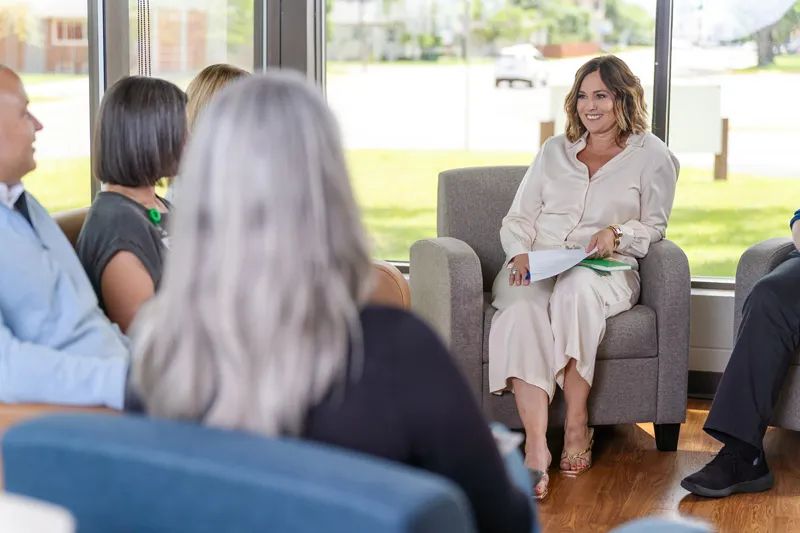
From there, she moved into early childhood intervention with Billings School District 2. The work was hands-on and often involved the toughest cases. She worked with families — some facing extreme poverty, others battling substance abuse — having tough conversations with parents about their children’s disabilities and delays.
“To come in with an open mind — to sit on the floor with people who are living in poverty or with challenging circumstances — and still be able to connect and relate,” Erika says. “Honestly, it was incredible to me what people could do against the odds.”
As Erika was earning her master’s degree in mental health counseling at Montana State University Billings, she became a crisis counselor at Tumbleweed, a nonprofit that supports homeless and runaway teens.
“That was my first real go at some pretty extreme situations,” she says. “I remember being on call — I had two phones. I had the parents on one and 9-1-1 on the other. A dad had a gun to his kid’s head, and I was trying to de-escalate the situation.” She adds, “I learned how to be cool when you’re scared shitless.”
It’s a mindset she’s carried with her — allowing her to stay steady amid chaos. “It’s important,” she says. “I can say, ‘I’m not sure what we’re going to do, and I feel a little nervous, but I’ve got this.’ I think people need that.”
Looking back, she can see how each professional experience built on the last and how each brought a valuable lesson.
At Girl Scouts of Montana and Wyoming, where she was Chief Development Officer, she says, “I feel like I got my MBA there.” She learned that nonprofits can run like businesses—making strategic decisions while driving social change.
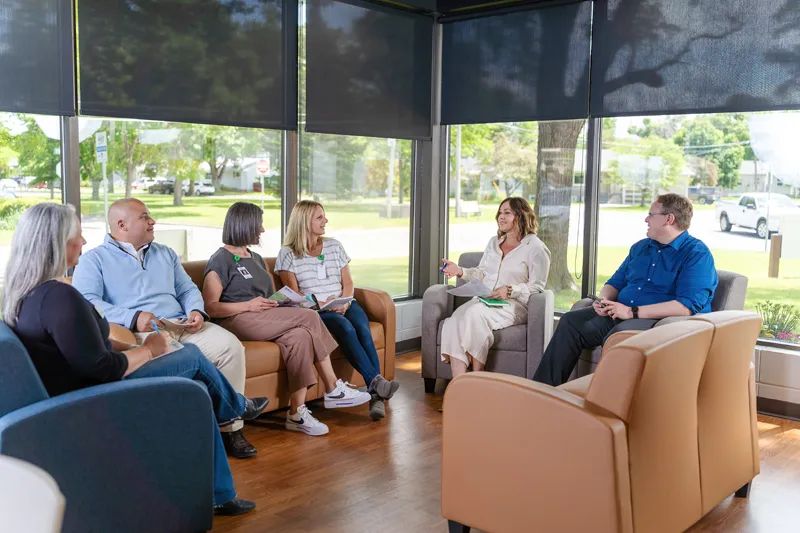
At STEP, which stands for Support and Techniques for Empowering People, Erika took on her first executive director role, helping empower individuals with disabilities and their families. There, she learned what it meant to lead upwards of 90 employees and handle a multi-million-dollar budget. She also learned the importance of humility in problem-solving.
Thanks to her, STEP’s once contentious relationship with Early Childhood Intervention was put aside, and the result was a unified force for children. “We brought our teams together,” Erika says. “We were able to change the referral process for 0- to 3-year-olds in the county, so we were able to get to kids quicker and help more families.” Translation: lives were changed.
From there, Erika would spend half a dozen years honing her skills in the private sector. She worked for Elation, a tech company focused on leadership and team development. She learned how to navigate the corporate world —engaging with CEOs, reading financial reports, and improving employee engagement. The experience shaped her leadership style.
It was, however, her “heart of a social worker” that called her back to the nonprofit world.
“I learned that my work has to be very impactful, community-driven work,” Erika says. “I was missing that.”
This time, she’d return to Tumbleweed as the nonprofit’s executive director.
“Here, I learned about resistance and what that looks like in change management,” Erika says with a pensive look. Even though she was able to initiate a system to better track the youth served and help her team focus on teens at risk for human trafficking, there was some tension in vision. Erika wanted to invest in mental health services, but was met with resistance.
“Some things need really fast change,” she says. “There were times when people’s lives depended on it.”
That’s when Erika decided to move on and instead go into business for herself. She started a consulting firm and a leadership development program known as SheLeads. The effort still empowers women to get out of their comfort zones to thrive, not just survive.
In January of 2024, however, a job posting caught her eye. It was for an executive director at Adult Resource Alliance, a nonprofit launched by Yellowstone County in 1975 that’s been helping seniors, their families, and their caregivers ever since.
Erika admits she looked at that listing for what seemed like an eternity before applying. She remembers telling the board, “If you don’t want things to change, don’t hire me.” She laughs and adds, “I got an immediate call for a second interview.”
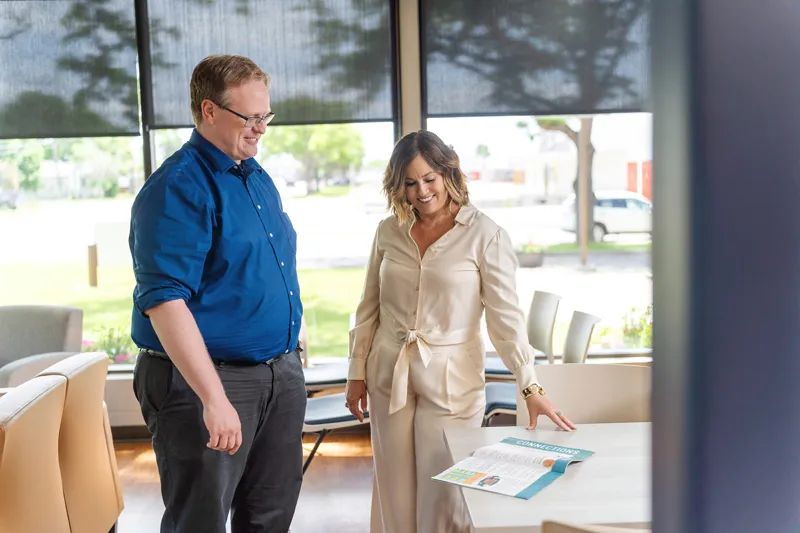
By that March, she was in the role, and it’s been a whirlwind since. In June of this year, Adult Resource Alliance announced a major merger with Big Sky Senior Services, a nonprofit dedicated to providing low-cost, in-home care to seniors. In July, the nonprofit underwent a major image overhaul, complete with a new name, Allies in Aging. Both were strategic moves, Erika felt, that could help with what she calls a major crisis.
“The senior system is in chaos right now,” Erika says. “The needs are so high that our community is not prepared.” The cause, she says, is an aging baby boomer generation.
“By 2040, there will be four times as many people who are 100 years old,” Erika says. “It will be a time when the population is aging at a rate that is not manageable. We are starting to see the healthcare system, housing system, and emergency response system feel the weight of it.”
Erika saw a chance for the organization to lead, unite others, and streamline services through the merger—saving money and ultimately reaching more people through expanded programs. She’s quick to point out, however, that her predecessor, Mike Larson, helped start the conversation that she and the CEO of Big Sky Senior Services, Tyler Amundson, helped pick up.
“Tyler and I sat down right at the very beginning, and we were able to have very candid conversations about needs and say, you know, we are the two providers for seniors in the county,” Erika says. “How are we going to meet those needs? How are we going to do this?”
She went back to one of her strengths to find the answer — looking at an organization from a “50,000-foot view” to see how it all fits.
“Looking at the system, being able to pinpoint where the gaps are, attach that to a budget — because there is always a bottom line impact — and then be able to make hard decisions,” she says. “I’m not afraid to step into something that feels like conflict, knowing that it will impact the bigger picture in a positive way.”
One of the moving parts in the merger was creating what she calls “a very strong leadership team” —people she calls really smart, really humble, and hungry to get the work done.
“When I can empower someone to be themselves and hold them accountable and they hold themselves accountable, these cool gifts show up that you never even knew you needed to make something happen,” she says.
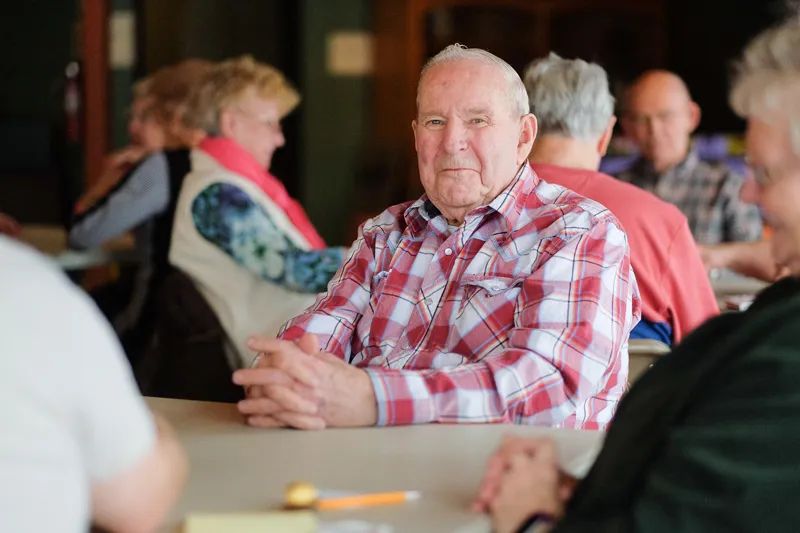
As the balloons still hung in the organization’s lobby announcing the merger, a handful of people on Erika’s team gathered around the table where seniors had just eaten lunch to talk about what’s on the horizon. Every one of them loved the new name and tag line: Allies in Aging—Senior Services, Lifelong Support.
“It’s exciting to think about being somebody’s ally, walking beside them and helping them find resources and navigate conflicts that they are unaware of,” says Evelyn Dempsey, the director of community services. “It’s exciting.”
They also agreed that Erika’s leadership was key.
“She empowers people and really brings out the best in her team, and she does it with grace,” Evelyn says. Jason Rodriguez, the organization’s finance director agreed, saying, “She has so much energy and vision. She doesn’t lead with a top-down approach. She asks, ‘What do you think?’”
The entire table nodded.
Tyler Amundson, once head of Big Sky Senior Services, is now the organization’s director of mission and development. Since the merger, he says, he’s seen Erika’s out-of-the-box thinking firsthand.
“Housing is an issue. Erika brought in one of her friends who does consulting on housing, and we have already been able to network with people,” Tyler says. “I had been working on that for two years and I hadn’t gotten that far.”
Tyler says not a week goes by that the organization doesn’t witness a senior facing a housing crisis.
“It’s heartbreaking when you get the phone call and someone says, ‘I’ve lived here for more than 20 years and all of a sudden, I can’t afford my rent anymore.’ There aren’t long term supports for people who are in those situations,” he says.
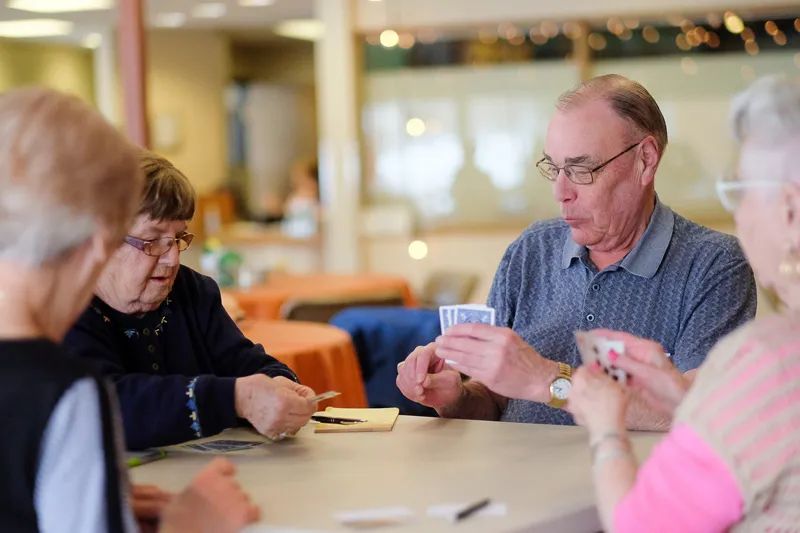
Beyond housing, the organization hopes to tackle critical challenges like transportation, in-home care, food security, and elder abuse prevention.
The organization receives anywhere from $1.7 to $1.9 million of its overall $5 million budget from the Yellowstone County Senior Mill Levy. “I feel really strongly about being good stewards of that money,” Erika says.
The merger, she says, is making that happen.
“It gives us more leverage and strength on a state and national level. It positions us really well to influence in a way that helps the community. We are going to be able to bring in more money. We are already experiencing that,” Erika says. It also helps keep money in the pockets of those they serve. "Someone who once was referred to in-home services through Big Sky might come in for that referral but once they are here, it’s determined that they don’t need that level of care,” Erika says, pointing to the organization’s hundreds of volunteers that might be mobilized to help instead.
When asked why the organization needed a new name, she smiles and says, “It makes a statement that we are walking with people. We are with you on this journey. You are not alone. An ally will fight for things.” The comment is proof that the fire in her belly still burns.
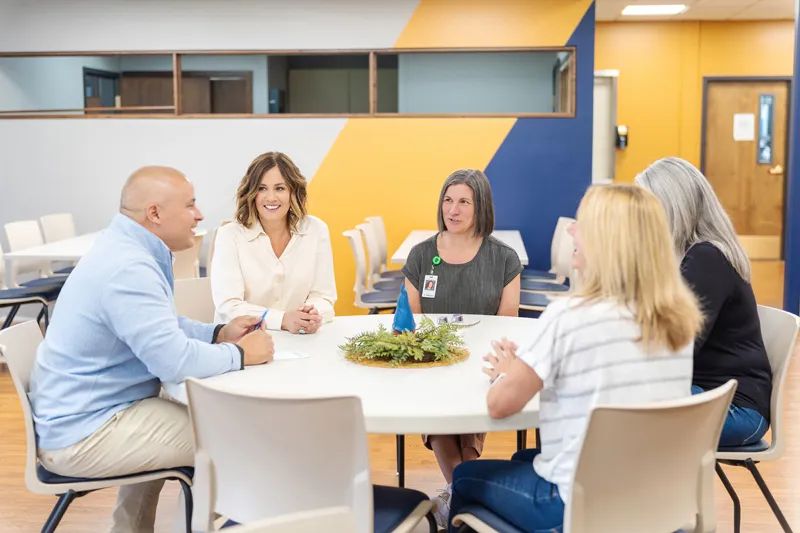
What does Erika’s five, or even 10-year plan look like for the organization? She has colorful and creative dreams.
“I can see a campus—a place where people have housing options and connections,” she says. “Did you know social connection is the number one thing that holds off dementia? That and exercise.” She also envisions a respite care center that feels like a spa—a place a caregiver can bring a loved one for a haircut or bath while they run errands.
At the heart of it, Tyler says, “There’s a need to serve every senior who walks in. Erika is passionate about making sure that happens.” He deeply respects that she built her career as a single mom, earning both a bachelor’s and a master’s in Rehabilitation and Mental Health Counseling during that time.
“I think people who go through that and raise amazing kids and still have a career are unique and inspiring,” he says.
At 52, Erika’s fingerprints are all over vital community nonprofits. She may not know what tomorrow brings, but she’s eager to keep fighting for the underserved. If there’s a constant in the kaleidoscope of experience she’s had in her professional life, it’s what she calls empathy in accountability. She calls it her superpower, and there’s little doubt she’ll continue to use it.
“You hold yourself accountable,” Erika explains. “You give it all you’ve got, and you do things that once seemed impossible, knowing they’ll impact the world in the way it needs.”
TO LEARN MORE ABOUT ALLIES IN AGING and the services provided, visit allianceyc.org.
